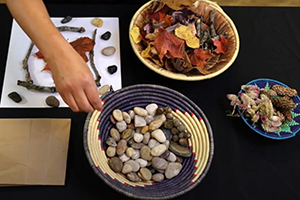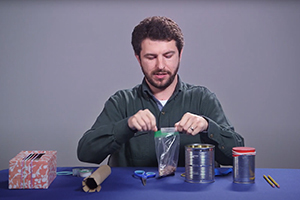By JULIE MINDA
Dec. 17, 2020
People around the world are struggling with their mental health and well-being during the pandemic. In the U.S., adults report "considerably elevated adverse mental health conditions" since the pandemic's onset, according to the Centers for Disease Control and Prevention.
The CDC says that young adults, racial and ethnic minorities, essential workers and unpaid adult caregivers report increased substance use, and elevated suicidal ideation as compared with other groups.

Lynn Genz, an art therapist at SSM Health, demonstrates how to create artwork using leaves, stones and other items collected on a nature walk.
To help its own overtaxed staff and the public gain serenity and build coping mechanisms through art, meditation and mindfulness, St. Louis-based SSM Health created the "Finding Peace in the Pandemic" video series. Music and art therapists, a chaplain and a chief mission integration officer lead segments that offer self-care activities and tips. Currently there are nine short videos in the series, with running times from six to 11 minutes. The videos are publicly available at ssmhealth.com/coronavirus-(covid-19)/coronavirus-updates/finding-peace-in-the-pandemic[JV3].
Dr. Heather Schmidt is system medical director of healthy work and wellness for SSM Health. She said that the level of anxiety, depression and stress that people are experiencing under the pandemic – as confirmed in multiple studies – is very alarming.

Brian Hilderbrand, a music therapist with SSM Health at Home Hospice, assembles a homemade musical instrument with empty soup cans and dried beans and rice.
In May and June, SSM Health's work and wellness committee partnered with the American Medical Association to survey SSM Health associates on their mental health and well-being needs. The organizations used AMA's "Coping with COVID-19 Survey," a modification of an AMA assessment tool that measures burnout. Schmidt said the survey uncovered high levels of anxiety, depression, stress and burnout among employees — findings consistent with national benchmarks.
"The pandemic has impacted all of us – patients, community members, providers, nurses," she said. "It's been disrupting our lives, and people are struggling." Intended for "anyone and everyone" experiencing distress, the videos can serve as a starting point to addressing mental health concerns, she said, noting that SSM Health offers a range of mental health services in the communities where it operates.
Lynn Genz, an art therapist at SSM Health, explains in one video how to use art for relaxation and coping and to seed joy. She demonstrates how to make a mandala using sticks, leaves, rocks and acorns found on a nature walk. Mandala art represents the universe and its impermanence in Buddhist and Hindu traditions.
In another video, music therapist Brian Hilderbrand of SSM Health at Home Hospice leads viewers through a "progressive relaxation" music therapy exercise. As he strums chords on his guitar, he prompts the viewer to tense and relax different areas of the body. In another video, Hilderbrand explains how to inspire kids to create homemade instruments using empty soup cans and dry rice and beans, and the like.
In her video, SSM Health art therapist Sarah Drake-Ricart demonstrates sensory mindfulness drawing to promote relaxation.
In other segments, SSM Health Saint Louis University Hospital chaplain John Allen leads a relaxation practice of breathing from the core and SSM Health Chief Mission Integration Officer Patrick McCruden describes how the practice of gratitude can promote positive mental health.
Schmidt said it takes just a few minutes to practice basic types of self-care. Simply looking outside, taking a deep breath and feeling the sun on one's skin can reduce stress. Schmidt noted that studies have shown that these types of brief stress breaks, as well as the ones covered in the videos, reduce muscle tension, decrease anxiety and enhance people's relationships with others.
"People don't have to feel overwhelmed" at the prospect of finding ways to take care of themselves – "it doesn't have to be some huge exercise," she said.
A work and wellness steering committee at SSM Health, headed by Schmidt, has devoted much of its time since the spring to addressing what she described as the rapidly increasing mental health needs of SSM Health staff, providers and community members.
Prior to the pandemic, SSM Health and the Harvard University Study on Adult Development and the related Lifespan Research Foundation were working together to create an employee wellness program for SSM Health, which was to launch in March. When the pandemic hit, these organizations switched gears and developed and implemented employee well-being programs that focused on connectivity and relationships and countering isolation.
SSM has added questions on stress and rest to the prompts that come up when its COVID medical screening is administered to employees. Asking the questions reminds the employees to stay aware of their stress level and the amount of rest they are getting. The screening app provides links to resources on mental health and well-being, including information on the employee assistance program.
CHA offers well-being resources
CHA has developed a collection of resources to promote self-care, particularly during the pandemic. Available at chausa.org/well-being, the online materials include prayers, meditations, a conversation guide for ministry facilities, videos and other items.
Copyright © 2020 by the Catholic Health Association
of the United States
For reprint permission, contact Betty Crosby or call (314) 253-3490.